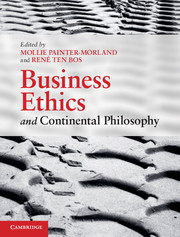Book contents
- Frontmatter
- Contents
- Figures
- Boxes
- Contributors
- Foreword
- Acknowledgements
- Introduction: critical crossings
- 1 Agency in corporations
- 2 Stakeholder theory
- 3 Organizational culture
- 4 Enron narrative
- 5 Moral decision-making
- 6 Organizational justice
- 7 Reward, incentive, and compensation
- 8 Leadership
- 9 Whistle-blowing
- 10 Marketing, bad faith, and responsibility
- 11 Corporate social responsibility
- 12 Corporate responsibility standards
- 13 Sustainability
- 14 Globalization
- Glossary
- Name index
- Subject index
- References
13 - Sustainability
Published online by Cambridge University Press: 05 June 2012
- Frontmatter
- Contents
- Figures
- Boxes
- Contributors
- Foreword
- Acknowledgements
- Introduction: critical crossings
- 1 Agency in corporations
- 2 Stakeholder theory
- 3 Organizational culture
- 4 Enron narrative
- 5 Moral decision-making
- 6 Organizational justice
- 7 Reward, incentive, and compensation
- 8 Leadership
- 9 Whistle-blowing
- 10 Marketing, bad faith, and responsibility
- 11 Corporate social responsibility
- 12 Corporate responsibility standards
- 13 Sustainability
- 14 Globalization
- Glossary
- Name index
- Subject index
- References
Summary
Goals of the chapter
After studying this chapter you will be able to:
understand why sustainable development has become an important issue for business corporations;
understand the skepticism that mainstream approaches towards sustainability have generated;
understand how discussions about sustainability impact on the variety of ways we have come to understand ‘nature’ as opposed to ‘culture’;
understand how these discussions might change the way we think about the role that scientists play in our society;
understand Latour's distinction between ‘matters of fact’ and ‘matters of concern’.
Introduction
Why is ‘sustainability’ or ‘sustainable development’ important to business? A standard argument goes like this: when we say that economies grow, we imply that they become ‘bigger’, but ‘bigger’ does not mean ‘better’ and ‘better’ is what should matter more than ‘bigger’. We might refer to an economy that is becoming better as a ‘developing’ economy. A growing economy is not the same as a developing economy, because no economy can grow indefinitely whereas all economies can develop indefinitely. To make economies better rather than to make them grow is therefore a primary ethical obligation for business. To put it differently, one cannot speak of sustainable growth but one can speak of sustainable development. In the end, all businesses will benefit from it, and not just a few.
- Type
- Chapter
- Information
- Business Ethics and Continental Philosophy , pp. 285 - 305Publisher: Cambridge University PressPrint publication year: 2011



